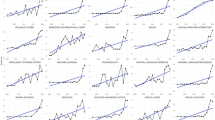Abstract
This study reports results on the real-time consequences of aspectual coercion. We define aspectual coercion as a combinatorial semantic operation requiring computation over and above that provided by combining lexical items through expected syntactic processes. An experiment is described assessing whether or not parsing of a string requiring coercion—in addition to syntactic composition—is more computationally costly than parsing a syntactically transparent counterpart, a string that provides for an interpretable representation via syntactic composition alone. The prediction of a higher computational cost for this process is borne out by the results.
Similar content being viewed by others
REFERENCES
Abney, F. T, & Johnson, M. (1991). Memory requirements and Local ambiguities of parsing strategies [special issue on sentence processing]. Journal of Psycholinguistic Research, 20, 233-250.
Boland, J. (1996). The relationship between syntactic and semantic processes in sentence comprehension. Unpublished manuscript. Department of Psychology, Ohio State University.
Chierchia, G. (1984). Topics in the syntax and semantics of infinitives and gerunds, Doctoral dissertation, University of Massachusetts, Amherst, MA.
Chomsky, N. (1981). Lectures on government and binding. Dordrecht: Foris.
Chomsky, N. (1995). The minimalist program. Cambridge, MA: MIT Press.
Francis, W. N., & Kucera, H. (1982). Frequency analysis of English usage: Lexicon and grammar. Boston, MA: Houghton Mifflin.
Gerratt, B., & Jones, D. (1987). Aphasic performance on a lexical decision task: multiple meanings and word frequency. Brain and Language, 30(1), 106-115.
Hickok, G. (1993). Parallel parsing: Evidence from reactivation in garden path sentences. Journal of psycholinguistic research, 22(2), 239-250.
Jackendoff, R. (1997). The architecture of the language faculty. Linguistic Inquiry Monograph. Cambridge, MA: MIT Press.
Jastrzembski, J. (1981). Multiple meanings, number of related meanings, frequency of occurrence and the lexicon. Cognitive Psychology, 13(2), 278-305.
Jastrzembski, J., & Stanners, R. (1975). Multiple word meanings and lexical search speed. Journal of Verbal Learning and Verbal Behavior, 14(5), 534-537.
Kellas, G., Ferraro, F. R., & Simpson, G. (1988). Lexical ambiguity and the time-course of attentional allocation in word recognition. Journal of Experimental Psychology, Human Perception and Performance, 14(4), 601-609.
Lee, C. (1990). Some hypotheses concerning the evolution of polysemous words. Journal of Psycholinguistic Research, 4, 211-219.
McElree, B., and Griffith, T. (1995). Syntactic and thematic processing in sentence comprehension: Evidence for a temporal dissociation. Journal of Experimental Psychology: Learning, Memory, and Cognition, 21, 134-157.
Miller, G. (1985). Dictionaries in the mind. Language and Cognitive Processes, 3, 171-185.
Millis, S., & Button, S. (1989). The effect of polysemy on lexical decision time: Now you see it, now you don't. Memory and Cognition, 17(2), 141-147.
Moens, M., & Steedman, M. (1987). Temporal ontology in natural language, pp. 1-7. Proceedings of the 25th ACL meeting. Stanford, CA.
Partee, B. and Rooth, M. (1983). Generalized conjunction and type ambiguity. In R. Bauerle, C. Schwarze, and A. von Stechow (Eds.), Meaning, use, and interpretation of language, (pp. 362-383). Berlin: Walter de Gruyter and Co.
Pustejovsky, J. (1991a). The generative lexicon. Computational Linguistics, 17, 409-441.
Pustejovsky, J. (1995). The generative lexicon. Cambridge, MA: MIT Press.
Schmauder, A. R., Kennison, S. M., & Clifton, Jr. C. (1991). On the conditions necessary for obtaining argument structure complexity effects. Journal of Experimental Psychology: Learning, Memory and Cognition, 16(6), 1188-1192.
Shapiro, L. P., Brookins, B., Gordon, B., & Nagel, N. (1991). Verb effects during sentence processing. Journal of Experimental Psychology: Learning, Memory, and Cognition, 17, 983-996.
Shapiro, L. P., Zurif, E., & Grimshaw, J. (1987). Sentence processing and the mental representation of verbs. Cognition, 27, 219-246.
Shapiro, L. P., Zurif, E., & Grimshaw, J. (1989). Verb representation and sentence processing: contextual impenetrability. Journal of Psycholinguistic Research, 18, 223-243.
Swinney, D., Zurif, E., & Nicol. J. (1989). The effects of focal brain damage on sentence processing: an examination of the neurological organization of a mental module. Journal of Cognitive Neuroscience, 1, 25-37.
Talmy, L. 1978. The relation of grammar to cognition: A synopsis. In D. Waltz (Ed.), Theoretical issues in natural language processing, Vol. 2 (pp. 14-24). New York: Association for Computing Machinery.
Vendler, 1967. Linguistics in philosophy. Ithaca: Cornell University Press.
Verkuyl, H. 1989. Aspectual classes and aspectual composition, Linguistics and Philosophy, 12, 39-94.
Verkuyl, H. 1993. A theory of aspectuality. Cambridge, UK: Cambridge University Press.
Author information
Authors and Affiliations
Rights and permissions
About this article
Cite this article
Piñango, M.M., Zurif, E. & Jackendoff, R. Real-Time Processing Implications of Enriched Composition at the Syntax–Semantics Interface. J Psycholinguist Res 28, 395–414 (1999). https://doi.org/10.1023/A:1023241115818
Issue Date:
DOI: https://doi.org/10.1023/A:1023241115818




